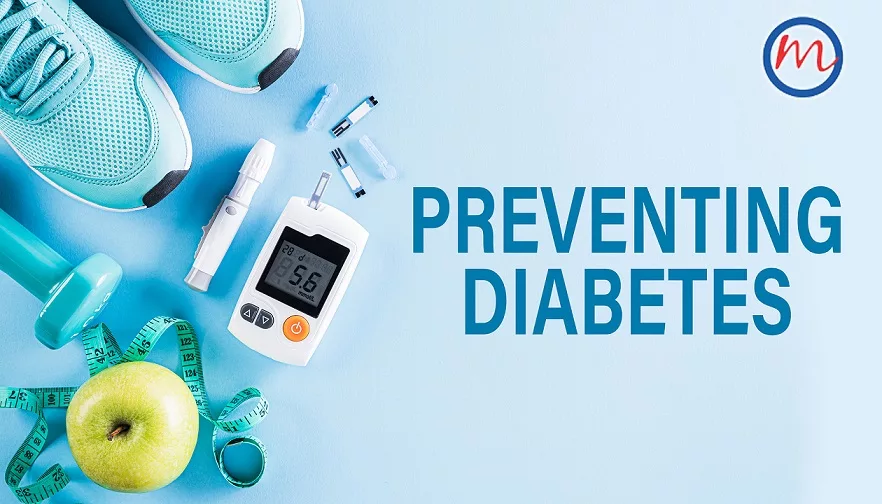Taking Charge of Your Health: A Guide to Preventing Diabetes
Diabetes is a chronic condition that affects millions of people worldwide. It is characterized by high blood sugar levels and is associated with numerous health complications, including heart disease, kidney problems, and nerve damage. The good news is that, in many cases, type 2 diabetes, the most common form of the condition, is preventable through lifestyle modifications and early intervention. In this comprehensive guide, we will explore how to prevent diabetes, focusing on strategies related to diet, exercise, weight management, and other essential aspects of a healthy lifestyle.
What is Diabetes?

Before we dive into diabetes prevention, it’s crucial to understand the condition itself. Diabetes is a metabolic disorder characterized by elevated blood sugar levels, which can lead to various health complications. There are several types of diabetes, including type 1, type 2, and gestational diabetes. In type 1 diabetes, the body’s immune system mistakenly attacks and destroys insulin-producing cells in the pancreas. Type 2 diabetes, on the other hand, typically develops due to a combination of genetic and lifestyle factors, including poor diet and lack of exercise. Gestational diabetes occurs during pregnancy and usually resolves after childbirth.
The hormone insulin plays a pivotal role in regulating blood sugar. In type 1 diabetes, the body does not produce insulin, while in type 2 diabetes, the body’s cells become resistant to insulin. Understanding these basics is essential for diabetes prevention, as it can inform the lifestyle changes needed to maintain healthy blood sugar levels.
The Importance of Prevention

Preventing diabetes is not just about avoiding a diagnosis; it’s about safeguarding your long-term health. Diabetes is associated with a range of complications, such as cardiovascular disease, kidney problems, vision issues, nerve damage, and more. By taking proactive steps to prevent diabetes, you can significantly reduce your risk of these life-altering complications.
Early detection and intervention are also crucial aspects of diabetes prevention. Regular health check-ups and monitoring of blood sugar levels can help identify prediabetes, a condition that precedes type 2 diabetes. Identifying prediabetes allows for early intervention, potentially preventing the development of full-blown diabetes through lifestyle modifications.
Diet and Diabetes Prevention

Diet plays a fundamental role in diabetes prevention. The food you eat directly impacts your blood sugar levels, making it essential to make healthy choices. Some key nutritional strategies to prevent diabetes include:
- Whole Foods vs. Processed Foods: Prioritize whole, unprocessed foods like fruits, vegetables, whole grains, lean proteins, and healthy fats. Minimize your intake of processed and sugary foods.
- Carbohydrate Management: Pay attention to your carbohydrate intake. Carbohydrates break down into sugar, affecting blood sugar levels. Choose complex carbohydrates like whole grains and legumes over simple carbohydrates like sugary snacks.
- Fiber and Diabetes: Fiber-rich foods, such as vegetables, fruits, whole grains, and legumes, help stabilize blood sugar levels and promote satiety.
- Protein Sources: Include lean sources of protein in your diet, such as poultry, fish, tofu, and legumes. Protein can help manage appetite and reduce the impact of carbohydrates on blood sugar.
- Healthy Fats: Choose sources of healthy fats, such as avocados, nuts, seeds, and olive oil, while limiting saturated and trans fats.
- Portion Control: Be mindful of portion sizes to avoid overeating, which can lead to weight gain and blood sugar spikes.
-
Glycemic Index and Load: Understand the concept of glycemic index (GI) and glycemic load (GL) to choose foods that have a lower impact on blood sugar. Low-GI foods include most non-starchy vegetables, legumes, and whole grains.
Physical Activity and Diabetes Prevention

Exercise is a potent tool for diabetes prevention. It has several beneficial effects, including:
- Blood Sugar Control: Physical activity helps your cells become more sensitive to insulin, allowing for better blood sugar control.
- Weight Management: Regular exercise can help with weight management and reduce the risk of obesity, a significant risk factor for type 2 diabetes.
-
Creating a Sustainable Exercise Routine: Find physical activities you enjoy, whether it’s walking, running, swimming, dancing, or participating in team sports. Consistency is key, so choose activities you can sustain over the long term.
Weight Management and Diabetes Prevention

Weight management is closely linked to diabetes prevention, particularly for type 2 diabetes. The relationship between weight and diabetes risk is complex but well-established. Strategies for healthy weight management include:
- The Connection Between Weight and Diabetes: Excess body weight, especially around the abdomen, is a significant risk factor for type 2 diabetes. Even modest weight loss can have a substantial impact on diabetes risk.
- Strategies for Healthy Weight Loss: Focus on gradual and sustainable weight loss, aiming for 1-2 pounds per week. Crash diets are often ineffective and difficult to maintain.
- Setting Realistic Goals: Establish achievable goals for weight loss and maintenance. Aiming for a specific percentage of body weight reduction is often more realistic and motivating.
-
Healthy Approaches to Weight Maintenance: Maintaining a healthy weight over the long term is equally important. A balanced diet, regular exercise, and a supportive environment are essential for weight maintenance.
Stress Management and Diabetes

Stress can affect blood sugar levels by triggering the release of stress hormones like cortisol. Chronic stress may contribute to the development of type 2 diabetes. To manage stress effectively, consider the following strategies:
- The Link Between Stress and Blood Sugar: Understand how stress impacts your body’s response to insulin and blood sugar levels.
- Relaxation Techniques: Practice relaxation techniques like deep breathing, progressive muscle relaxation, and guided imagery to reduce stress.
- Mindfulness and Meditation: Mindfulness practices, such as meditation and yoga, can help you manage stress and maintain emotional well-being.
-
Importance of Sleep: Prioritize adequate sleep, as sleep deprivation can lead to increased stress and negatively affect blood sugar control.
Regular Health Check-Ups for Diabetes

How to prevent diabetes? Monitoring your health is an essential aspect of diabetes prevention. Regular check-ups and health assessments can help you stay informed about your risk factors and overall health. Key considerations include:
- Monitoring Blood Sugar Levels: Periodic testing of fasting blood sugar and HbA1c (average blood sugar levels over a few months) can help identify prediabetes or diabetes.
- Routine Medical Examinations: Annual check-ups with your healthcare provider can include blood pressure monitoring, cholesterol checks, and discussions about your overall health.
-
Importance of Early Detection: Early detection of prediabetes allows for timely intervention to prevent the development of type 2 diabetes. This includes lifestyle modifications and potentially medication if recommended by your healthcare provider.
Limiting Alcohol and Avoiding Smoking

Unhealthy lifestyle choices like excessive alcohol consumption and smoking can contribute to diabetes risk. Addressing these habits is an important part of diabetes prevention:
- Alcohol and Blood Sugar: Limit alcohol consumption, as excessive drinking can lead to blood sugar fluctuations. Be mindful of the carbohydrate content in alcoholic beverages.
- The Impact of Smoking on Diabetes Risk: Smoking is associated with an increased risk of type 2 diabetes. Quitting smoking is one of the most beneficial steps you can take to lower your diabetes risk.
Community Support and Education

Preventing diabetes often involves more than just individual effort. Community support and education can be invaluable:
- Diabetes Prevention Programs: Many communities offer diabetes prevention programs that provide guidance, support, and educational resources. These programs often include lifestyle modification classes and group support.
- Support Groups: Joining a diabetes support group or a group focused on healthy living can provide motivation and accountability.
-
Public Health Initiatives: Stay informed about public health campaigns and initiatives aimed at preventing diabetes and improving overall community health.
Genetic Risk Factors and Prevention

While genetics play a role in diabetes risk, they don’t determine your destiny. Understanding your genetic risk factors and taking preventive action is important:
- Family History: If you have a family history of diabetes, you may be at a higher risk. Inform your healthcare provider about your family history to receive appropriate guidance.
- Genetic Testing: Genetic testing can provide insights into your diabetes risk. Your healthcare provider can help you interpret these results and develop a personalized prevention plan.
-
Tailoring Prevention Efforts: Knowing your genetic risk can help you and your healthcare provider tailor your diabetes prevention strategies to your unique needs.
Special Considerations for Children and Adolescents

Childhood obesity is a significant concern, as it is a risk factor for type 2 diabetes. Encouraging healthy habits in children and adolescents is crucial:
- Childhood Obesity: Recognize the importance of a balanced diet, regular physical activity, and limited screen time in preventing obesity and type 2 diabetes in children.
-
Encouraging Healthy Habits in Youth: Be a positive role model for children by promoting healthy eating, being active together as a family, and limiting sedentary behaviors.
Conclusion: How to Prevent Diabetes?

How to prevent diabetes? Preventing diabetes is a multifaceted endeavor that involves making informed choices about diet, exercise, stress management, and overall well-being. By taking proactive steps and seeking support from healthcare providers and your community, you can significantly reduce your risk of developing type 2 diabetes. Remember that diabetes prevention is an ongoing journey, and the habits you establish now can positively impact your health for years to come. Make a commitment to take charge of your health, prioritize prevention, and enjoy a future of better well-being.
This comprehensive guide provides valuable insights into the prevention of diabetes, a condition that affects a significant portion of the global population. By implementing these strategies and making informed choices, individuals can take proactive steps to lower their risk of diabetes and its associated complications. Remember that diabetes prevention is not just a one-time effort; it’s a long-term commitment to health and well-being.
Florida Health Care | Best Healthcare Provider in Florida

Welcome to Florida Health Care. Best Healthcare Provider in Florida. Empowering Floridians to Make Informed Health Care Decisions. Florida Urgent Care Centers is dedicated to providing excellent healthcare and ensure best practice standards. We can provide medical assistance anytime you become sick or injured, if you are out of town and need a refill or when your regular doctor is not available for you immediately and you can’t wait for an appointment.
CALL NOW +1-888-306-9302
How can we prevent getting diabetes?
Beyond individual behavior. Type 2 diabetes is largely preventable by taking several simple steps: keeping weight under control, exercising more, eating a healthy diet, and not smoking. Yet it is clear that the burden of behavior change cannot fall entirely on individuals.
What is a natural way to control diabetes?
There are multiple ways to naturally manage your blood sugar levels. Many of them include making lifestyle changes, like managing your weight, stress levels, and sleep quality, exercising, and staying hydrated. That said, some of the biggest improvements have to do with your dietary choices.
Is rice good for diabetes?
People living with diabetes and those with prediabetes can include rice as part of a healthy balanced eating pattern. Choosing more intact higher-fiber types of rice and watching portion sizes may help keep blood glucose in the target range.
What foods increase blood sugar?
In general, foods that cause blood sugar level to rise the most are those that are high in carbohydrates, which are quickly converted into energy, such as rice, bread, fruits and sugar. Next are foods high in protein, such as meats, fish eggs, milk and dairy products, and oily foods.
Is chicken good for a diabetic?
Chicken is rich in nutrients and protein and low in calories, making it ideal for people with diabetes trying to maintain a moderate weight and stay full for longer. Many people with diabetes aim to eat more healthily by eating protein-rich food. This makes chicken an ideal diet for diabetes as it is high in protein.

